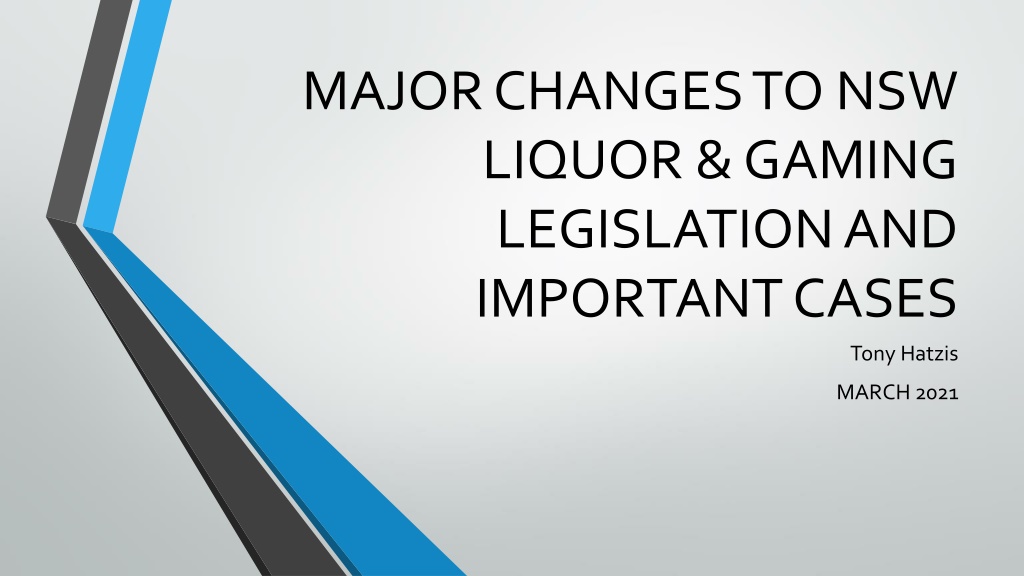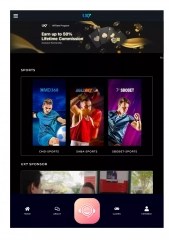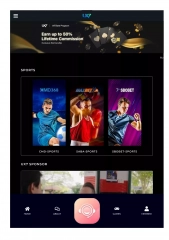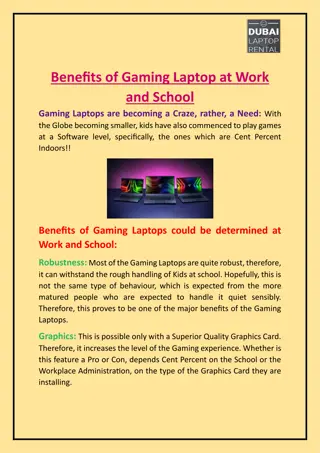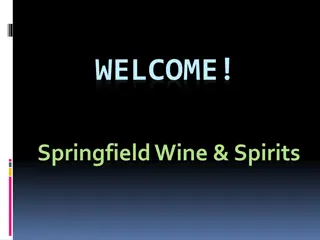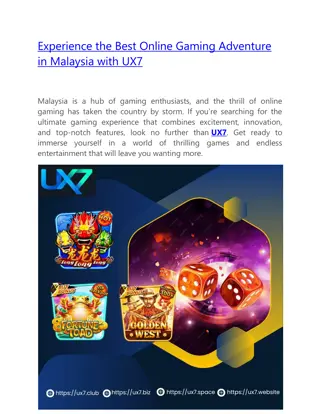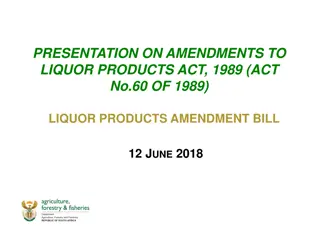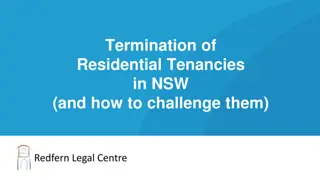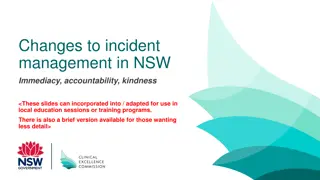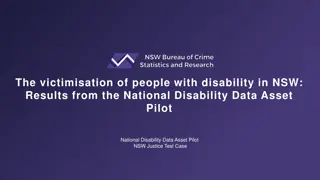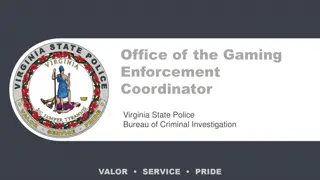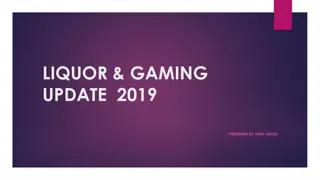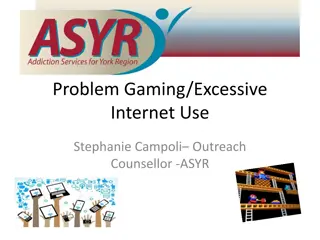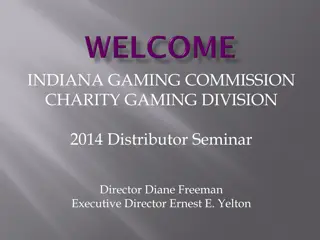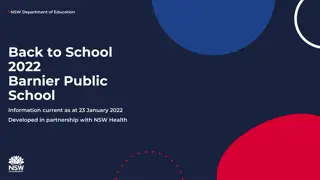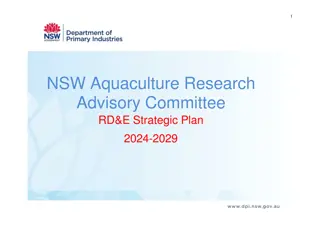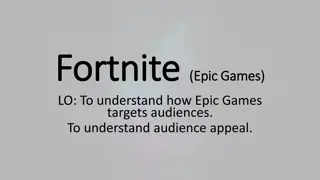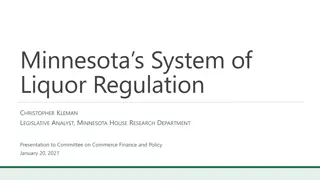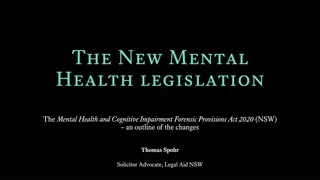Overview of Recent Changes to NSW Liquor and Gaming Legislation by Tony Hatzis
NSW Liquor and Gaming legislation has undergone significant changes, including amendments to support the night-time economy, lifting of freezes in Sydney and Kings Cross, new guidelines from ILGA, and research on after-midnight gambling. Key recommendations from a joint select committee aim to enliven the night-time economy, increase small bar capacities, and review lockout laws. The Sydney 24-hour Economy Strategy focuses on creating a vibrant and safe city known for its diversity and accessibility.
Download Presentation

Please find below an Image/Link to download the presentation.
The content on the website is provided AS IS for your information and personal use only. It may not be sold, licensed, or shared on other websites without obtaining consent from the author. Download presentation by click this link. If you encounter any issues during the download, it is possible that the publisher has removed the file from their server.
E N D
Presentation Transcript
MAJOR CHANGES TO NSW LIQUOR & GAMING LEGISLATION AND IMPORTANT CASES Tony Hatzis MARCH 2021
Liquor Amendment (Night-Time Economy) Act Lifting of the freeze in Central Sydney (and Kings Cross) New ILGA Guidelines, including guidelines for applications in former freeze area After-midnight gambling new research Gaming Machines Amendment (Gambling Harm Minimisation) Bill Disciplinary decisions on gaming Significant case law decisions:- -merits review to NCAT from ILGA decisions on after-midnight trading. -packaged liquor licences for convenience stores, general stores and mixed businesses 2
Joint Select Committee on Sydneys Night-time Economy Tables Report in 2019 with 40 recommendations including: Creating financial incentives for compliant venues Streamlining the existing sanctions schemes (including Three Strikes, Violent Venues and Minors Sanction Scheme) into one broader scheme Developing strategies to enliven the night-time economy including appointment of a 24-hour Economy Coordinator to develop strategies and to coordinate industry and government Streamline processes for removing licence conditions inhibiting live music Increase patron capacity of small bars and provide standard trading hours of 2.00am for small bars Lift the 1.30am lockout in the Sydney CBD Precinct, as well as drink restrictions in that Precinct 3
cont. Remove the 3.00am last drinks requirement (not supported by Government but extended to 3.30am for Sydney; 3.00am for Kings Cross Extend hours for sale of takeaway alcohol to midnight Monday to Saturday, and 11.00 pm Sunday Develop a tool to measure the cumulative impact of venues in a particular area Encourage development of secure taxi ranks Review continuation of the liquor freeze 4
Sydney 24-hour Economy Strategy Key takeaways: Create a 24-hour city world-renowned for vibrancy, diversity, safety and access to amenity right throughout the day and night A 24-hour metropolis and a truly global city Night-time economy in Greater Sydney worth $27.2 billion in 2017 supporting 234,000 jobs Rolling back the 2014 measures to reduce impact of alcohol-fuelled violence towards more vibrancy Creation of night-time hubs across Greater Sydney creating a neon grid across Greater Sydney Links in with City Light Rail and greater availability of public transport Noted that Sydney ranked 48th out of 48 global cities in a 2019 Timeout survey on overall night-time experience 5
cont. Automatic removal of anti-live music conditions Liquor & Gaming NSW review of live entertainment conditions from 11 December 2020 Conditions to be reviewed and removed conditions a)restricting genre of music (eg Terrigal Hotel condition no live/rock bands ) b)Number of musicians, type of instruments c) Direction of play d)Prohibitions on live or amplified music Other conditions not automatically removed subject to a free no application fee review (subject to normal processes) Fee reductions for live music venues 30-minute extra liquor service period for dedicated live music venues in the Sydney LGA, where live music performances occur 6
Relaxing small bar rules from 11/12/2020 Allowing minors in the company of a responsible adult during meal times, where meals are provided at a table New minors authorisation otherwise for small bars, up until midnight Interim approvals for small bars-similar to restaurants Can open outside licensed trading hours (e.g. breakfast) Takeaway craft cocktails Note amended reg January 21-no regular adult entertainment of a sexual nature 7
From 1 January 2021 new demerit points system / scrapping of Violent Venues Scheme / Minors Sanction Scheme / Three Strikes Scheme Delete existing Part 9A (Three Strikes) Delete existing Part 7 Division 4 (Minors Sanction Scheme) Delete Schedule 4 (Violent Venues Scheme) Existing strikes revoked but any remedial action taken previously continues 8
cont. Note new demerit offences only apply if the offence occurs on or after 1 January 2021 Category 1 demerit offences carry one demerit point Trading beyond permitted hours Breaching any lockout requirements Permit sale of drugs Permit intoxication/permit violent or quarrelsome conduct Miscellaneous other (e.g. not comply with section 75 direction) Category 2 demerit offences carry two demerit points. These are for sale, supply liquor to minor 9
cont. Incurring a demerit offence if: Court conviction Payment of penalty notice Penalty enforcement order Demerit points cease to have effect if appeal lodged, Court election is made or enforcement order is withdrawn or annulled Only one demerit offence if multiple offences occur within single 24-hour period (what about a 1-point offence and a 2-point offence?) 10
cont. Public register of demerit points to be maintained by the Secretary No demerit points if Court makes an order under sec 10 Crimes (Sentencing Procedure) Act. Demerit points last for three years. Commences from date of commission of the offence (except for prescribed complaints commences 3 years from the date of ILGA determination) Notice of demerit points is given to licensee/manager/club manager/secretary 11
Prescribed complaint procedure New prescribed complaint procedure for: Two or more serious indictable offences involving violence committed in 12 months by patrons on the premises, patrons leaving the premises or would be patrons attempting to enter or been refused entry, near the premises [NEW GROUND]; or Two or more incidents posing a serious risk to health and safety have occurred within a 12-month period involving patrons on premises, patrons leaving the premises or would be patrons entering or refused entry, near the premises [NEW GROUND]; A person commits a serious indictable offence if a Court convicts the person for the offence Near means within 50 metres: sec 139(3) 12
cont. Prescribed complaint procedure also available for some existing grounds of complaint: Engaging in conduct/activities likely to encourage misuse or abuse of liquor, Intoxicated persons frequently been on the premises or frequently seen to leave the premises, Acts involving violence against persons or damage to property, frequently committed on or near the premises by patrons In the case of a prescribed complaint, the Authority has a discretion to impose one or two demerit points against the licensee/manager/club 13
Remedial Action Available sanctions depend on how many demerit points accumulate during any 3-year period. If 2-3 demerit points are incurred, the Authority may: reprimand licensee/manager; or require licensee/manager to undertake training courses; impose any condition necessary to address the risk of re-offence. 14
cont. If 4-5 demerit points are incurred, the Authority may: [as above]; or disqualify the licensee/manager for a specified period; suspend the licence for a period up to 7 days. If 6 or more demerit points are incurred, the Authority may: [as above]; or permanently disqualify the licensee/manager; suspend the licence for a period of up to 14 days. 15
Notice Provisions Prior notice of proposed remedial action to be given to the licensee/manager, owner of the premises, each party notified to the Authority as being interested in the business (business owner) and such persons may make submissions Notice also to be given to Police, Council and L&GNSW Authority to take account of a number of prescribed factors and any other matter the Authority considers relevant 16
NCAT Review NCAT review available to any party required to be given notice of proposed remedial action If merits review sought, any remedial action is stayed pending NCAT merits review decision Example of NCAT merits review under the Three Strikes Scheme: McIntosh v ILGA [2018] NSWCATAD 101 17
Procedure for Removal of Demerit Points If a licensee/manager/club has only one demerit point, then can apply to have the demerit point removed if no demerit offences in the preceding 10 years, there has been no repeat of the demerit offence (or any other demerit offence), no remedial action taken with, measures/traing taken to reduce risk and the original offence did not cause serious harm Other cases can apply after 12 months , if any remedial action complied with and above criterial also complied with. There is an NCAT review available against decisions to remove demerit points 18
Demerit Points and Risk-based Licensing Fees From 15/03/2024, a 5% discount against the base fee and trading hours risk loading applies if no demerit points incurred in the preceding 3-year period. From 15/03/2026, a 10% discount against the base fee and trading hours risk loading applies if no demerit points incurred in the preceding 5-year period. If demerit points incurred, then no discount and, in addition, a compliance history risk loading element of $4,000 for each demerit point in the subsequent licence assessment year (commencing following 15 March 2022). 19
The Liquor Freeze The liquor freeze first enacted in Sydney CBD and Kings Cross area in 2009, was renewed annually ever since. It applied to grants of new higher impact licences as well as applications for removal, extension of trading hours, to increased licence footprints and to change conditions on licences. 1/06/2020 cl 123 Liquor Regulation passed freeze does not apply to existing hotels, clubs, licensed public entertainment venues and packaged liquor outlets. So, for example, existing hotels can apply to extend hours in both precincts. Freeze continues to apply to applications for new higher risk licences in the freeze zone until 1/05/2021. (Note from 8 March lockout and drinks restrictions lifted in Kings Cross) 20
Cumulative Impact Assessments New statutory object in section 3-to support live music, arts, tourism, community and cultural sectors. All licensing decisions to take account of this object: section 45/48 New Division 5 of Part 4 dealing with cumulative impact assessments (CIA) for new grant or ETA for: Hotel licences (other than tourist accommodation establishments), Club licences On-premises licence for public entertainment venue (not cinema theatre or dedicated live music and performance venue); eg nightclubs On-premises licence with primary service authorisation (PSA) Packaged liquor licence Purpose of CIA is to guide the Authority s social impact consideration of particular applications. 21
cont. The Authority may trigger the section if it considers that the number of licences or related authorisations for a whole or any part of an LGA is such that granting any further licences/authorisations is likely to be inconsistent with the Authority s social impact duty. In that event, the Authority may prepare a CIA for that area. CIA must include: a) Reasons why granting further licences is likely to be inconsistent with their duty. b) Evidence for forming that opinion. c) A map showing the relevant area. CIA may also consider that ancillary applications (such as change of boundaries or extensions of hours) may be inconsistent with the social impact duty. Initially, CIAs are for Sydney LGA only, but this may be added to subsequently. 22
cont. In considering the merits of any particular application, ILGA is required to have regard to any published CIA that applies to the area in which the subject premises relate: sec 48(5)(a1) CIA to be arrived at after consultation with local Council, Police, Department of Health, representative body of licence holders to be published in draft before finalising. CIA to be published and to be reviewed every 2 years. The Authority may vary or revoke it at any time after consultation with stakeholders. 23
Interim Guideline 6.1 (June 2020) Draft CIA for Sydney LGA (from April 2021) 6.1 - Applies from 1/06/2020 (ie date of lifting of freeze for existing licences in the freeze zone) Creates a rebuttable presumption against the grant of an authorisation or approval to premises located in one of the four hot zones (North CBD around Wynyard, South CBD, Darlinghurst and Kings Cross), for applications to: Extend trading hours Change boundaries if patron capacity would increase Vary/revoke a condition that would result in increased hours or increase patron capacity Remove a licence from Kings Cross to Sydney CBD (carved out of the freeze in June 2020) Applies to hotels, clubs, on-premises public entertainment venues and packaged liquor licences 24
Hot Zones 25
cont. Remains open to the Authority to grant an application where the applicant can satisfactorily demonstrate they would not add to the cumulative impact and the Authority considers it appropriate . The Authority requires demonstration of positive social impacts on the community, showing benefits unique or distinct from other licensed businesses, or which enhance the vibrancy or character of an area. Specific measures, over and above, minimum legislative requirements, to deal with alcohol-related violence and/or anti-social behaviour. Support from local Council based on the positive social impacts. Support from the local Police of mitigation measures. Going dry after midnight to operate gaming machines will not satisfy the interim guideline. Interim guideline has been informed by high rates of crime in the hot zones and high licence densities. 26
Same-day deliveries starting 1/07/2021 Additional training requirements for deliverers ID must be produced and recorded Offence to supply liquor to an intoxicated person Cut off time for deliveries midnight Monday to Saturday, 11.00 pm Sunday Provision for self-exclusion by patrons from same-day deliveries 27
Other Changes Disturbance complaint procedure to the Authority does not apply to a complaint in relation to noise that is emitted wholly from within licensed premises [typically, music noise], unless the complaint is made by Police or Council, and Council has lodged a plan with LGNSW to deal with such complaints. Idea is that Councils can opt to cover the field regulating music noise also provisions to streamline and integrate planning/licensing functions. Report due within six months. MAA available for small bars until midnight. Even without an MAA, minors permitted in small bar when meals are provided until 10 PM. Small bars standard trading hours to 2 AM. Some live entertainment conditions restricting genre, number of musicians or acts, types of instruments that may be played cease to have effect from 11/12/2020: cl 70 , but Secretary may reimpose in the event of resident complaints. 30 minute extension to licensed trading hours in Sydney LGA dedicated live music venues (listed) Similar conditions not to be imposed on licences 28
Guideline 14 Concerns about staged applications being made within a short period of time. Public entitled to expect that business model will not change within 12 months, unless there are: Exceptional/unforeseen circumstances; and Community consultation undertaken All applications to change boundaries with an increase of 50% or more in floor area require a Category B Community Impact Statement. 29
After-midnight gaming More restrictive approach being taken Shutdown Periods for ElectronicGamingMachines the Snapcracker survey (2019) suggests problem gamblers are more likely to be playing late at night and more intensely than others, and will travel further to visit another venue if their own venue shuts. Distinguishes social and solitary late-night play the latter associated with problem gambling Desirable to have enforced break in play to reduce harm, sooner than current 4.00am shutdown. CQU Responsible Conduct of Gambling Study (2020) Described existing regulatory model as informed choice , in contrast to an interventionist model described as a harm minimisation approach . 30
cont. Found many pub and club employees have seen some signs of problem gambling, but few intervene, or report upwards . Few patrons self- exclude. Recommended greater controls, mandatory pre-commitment, mandatory intervention, reduce maximum bets, reduce numbers of EGMs and reduce trading hours in disadvantaged areas. Encourage family intervention and staff training to support intervention. Over 2020 and into 2021, there have been delays in processing applications. Not just extended hours but also reduced shutdown periods (3-hour shutdown period weekends and public holidays), threshold increases with LIA, and even transfers. 31
Guideline 16 BACKGROUND ILGA refer to past research, including 2019 NSW Gambling Survey Guideline is premised on assumptions said to be based on research, as follows: Greater risk of harm from EGMs than other forms of gambling; Problem gamblers may be over-represented after midnight, especially after 2.00am; After midnight, gamblers more likely to chase losses; More than half problem gamblers would go home if EGMs shut at a venue, rather than migrate. The minimum legal requirements, based on informed choice and voluntary self-exclusion, may be insufficient to manage risk. 32
cont. The expressed concerns: ILGA expresses concern about applications that increase availability of EGMs after midnight in Band 3, and after 2.00am in Bands 1 and 2. The Guideline applies to ETA applications, to increase gaming thresholds (LIA), reduce shutdowns on weekends and even transfers and leases. Consideration: In exercising its social impact discretion, ILGA will look at localised data and submissions involving demographics, problem gambling prevalence, gaming profit data, research literature and mitigating factors (eg. undertaking of no gaming after 2.00am) Above and Beyond ILGA will look more favourably on applications with additional gaming harm minimisation measures. See Going Above and Beyond leaflet attached to Guideline 16. Gaming Plan of Management (GPOM) Shopping list of measures that can be adopted and applied (advanced, intermediate, foundational). 33
Gaming Machines Amendment (Gambling Harm Minimisation) Bill Bill released for public consultation 25/09/20 Consultation period extended to 11/12/20 Bill not yet presented to Parliament Venues must exclude a person who has self-excluded or is subject to an exclusion order ($25,000 fine) Online self exclusion State-wide self exclusion register Involuntary exclusion orders may be made by a venue (on its own initiative) or at the request of a family member (spouse, child, sibling, parent). If application by family member, there is a process of referral to counselling and the venue must decide whether or not to exclude. An exclusion order must apply for a minimum of at least six months. Increased fines for some existing offences (eg ATM in gaming room) Gambling incident registers. To record any incident in which a patron displays any problematic gambling behaviour of a kind specified in guidelines issued by the Department and any response taken by the venue. 34
cont. Gambling contact officer to be appointed at each venue, who has done an advanced RCG course. Merits review by ILGA against decision by a venue to make or not make an involuntary exclusion order. Duty to take all reasonable steps to promote responsible gambling and take action if the incident register discloses any misuse or abuse of gambling activities: sec 48B ($11,000 fine) 35
Dee Why RSL Case arose out of the suicide of a club patron, Mr Gary Van Duinen. Patron was a Diamond member under the Club s reward scheme who lost $230,000 over a 3-year period. Mrs Van Duinen (wife) had spoken to Club officers and asked them to bar her husband prior to his suicide. He was on the Club s Top 100 list of gaming patrons (out of 50,000 members) and he was given unpublished discretionary rewards, including 2 harbour cruises and 2 VIP race days. These were provided on an ad-hoc basis to Top 100 members. Patron s wife was told that only way they could exclude him was if he self excluded. Club offered details of a counselling service to the wife and details of how her husband could self exclude. Complaint was that various actions of the Club encouraged, or were likely to encourage, the misuse and abuse of gambling activities. ILGA found the offering of special unpublished incentives to high rollers was likely to encourage Mr Van Duinen s use of gaming machines for his problem gambling by providing a significant incentive to gamble more and that the incentive was directed to the type of person most at risk of being a problem gambler. 36
cont. ILGA were not satisfied that the Club had encouraged the misuse and abuse of gambling merely by failing to take appropriate action in response to the wife s request. But ILGA did hold that the Club s failure to recognise overt signs of problem gambling in Mr Van Duinen did amount to conduct likely to encourage the misuse and abuse of gambling activities. ILGA referred to RCG Student Course Notes which identify various overt signs of problem gambling, including: Spending more than $300 in a session; Betting $2.50 or more per spin; Avoiding contact with others; Getting cash out of ATM twice or more; Betting continuously. On his last day, Mr Van Duinen lost $4,700 ($4.25 per spin) playing 68 machines and stayed at the Club alone for four hours after his friends had left. He got cash out four times from the ATM. 37
cont. Those facts, together with his previous heavy gambling at the Club (which the Club knew about and rewarded) together with approach made by his wife, put the Club on notice, and the Club should have recognised the serious potential for him to have a gambling problem. Club should have, but did not, take steps to determine if Mr Van Duinen had a problem. By failing to recognise that he had a gambling problem and/or failing to take action to further investigate that problem and act, the Club encouraged or was likely to encourage misuse and abuse of gambling activities. In other words, through its omissions, the Club was found to have engaged in conduct likely to encourage misuse and abuse of gambling activities. 38
cont. Sanctions imposed 1.A dedicated RCG Marshall at all times to monitor patrons for certain overt signs of problem gambling (see attached). 2.RCG incident register to be maintained, to record signs of problem gambling and any incidents. 3.Require third-party exclusions. 4.Penalties totalling $100,000 plus costs of around $80,000. 39
Dee Why RSL Conditions Below are the overt signs of problem gambling that the Dee Why RSL RCG Marshall is required to look for: Gambles every day of the week Gambles for three hours or more without a break of 15 minutes or longer Gambles so intensely that the person barely reacts to what was going on around them Plays very fast (e.g. Inserts large numbers of coins into the machine very rapidly, presses the buttons very rapidly so that the spin rate is very fast) Bets $2.50 or more per spin most of the time Gambles on 2 or more machines at once (where this is allowed by the venue) Gambles continuously Spends more than $300 in one session of gambling 40
cont. Stops gambling only when the venue is closing Finds it difficult to stop gambling at closing time Starts gambling when the venue is opening Is rude or impolite to venue staff Avoids contact, communicates very little with anyone else Stays on to gamble while friends leaves the venue Becomes very angry if someone takes the person s favourite machine or spot Borrows money from other people at venues Asks for a loan or credit from the venue. 41
ALH Case Disciplinary complaint Clause 47 GMR Hotelier must not permit any free or discounted liquor to be offered or supplied as an inducement to play, or play frequently, EGMs. No equivalent prohibition in Queensland. State operations Manager (Bensley) transferred from Queensland. ILGA found that Bensley/ALH encouraged the provision of shouts to patrons and managers were incentivised to offer shouts . While shouts were offered generally to all patrons, there was a focus on providing shouts to gaming patrons and that the incentive targets included the number of drinks given to gaming patrons. Staff were encouraged to give away all of their shout targets (generally, $100 each venue per day). Decisions on who got a shout were based on how much patrons gambled. ILGA found ALH intended that the free liquor was given to cause players to play more or for longer or to be more likely to return to gamble. 42
cont. Around $35,000 of free liquor given away annually at each venue. ILGA found that the targeted and systemic provision of free liquor to gaming players at the two pubs over a prolonged period was likely to encourage the misuse and abuse of gambling activities. ILGA found that Bensley exerted relentless pressure on licensees to achieve targets for supply of free liquor to gaming patrons, in breach of the Regulation. Bensley had been made aware of Police concerns about the promotions, but failed to inquire further, or to act. ALH knew, or ought reasonably to have known, of the practice and failed to take steps to prevent it. The failure to comply with Clause 47 was a systemic failure warranting disciplinary action. ILGA found ALH and its employees were aware of the prohibition on free drinks as an incentive to gamble, but tried to get around the prohibition by having patrons go to the general bar to get their free drinks. 43
cont. Authorisations to conduct gaming were suspended for two weeks at each pub, as a proportionate and targeted sanction reflecting the seriousness of the matter. In addition, Bensley disqualified for five years from being a close associate. Payment of cost of investigation of $172,000. Small fines for each licensee. 44
Henadeck Pty Ltd v ILGA [2020] NSWCATAP 200 Considered whether there is a merits review to NCAT from a decision of ILGA refusing an extension of trading hours. Standard trading period is Monday to Saturday 5.00 am to 12.00 midnight, Sunday 10.00 am to 10.00 pm. To trade outside those hours requires grant of an extended trading authorisation (ETA): sec 49(2). An ETA is for a specified period outside the standard trading hours and relates to particular parts of premises: sec 49(6). An ETA can be varied: sec 51(9)(b), temporally and/or spatially. Prior to 2015 was no right of merits review from any ILGA decisions. Sec 13A of GALA Act amended to give limited rights of review, but only for prescribed applications set out clause 7 of GALA Reg. Clause 7(b) GALA Reg gives right of merits review for an application for an ongoing ETA in relation to a [hotel/club] licence that will result in trading after midnight (So cannot apply to special occasion ETA or to ETAs for Sunday 10.00 pm to midnight). 45
cont. Section 13A merits review can be sought by a disappointed applicant (the Venue) or by a disappointed objector/submitter (eg a resident, Council or Police). In his 2R Speech, the Minister said merits review was intended for more contentious applications. This case concerned two pubs that already had a 2.00am ETA. Both sought to vary their ETAs to allow 4.00am trading. Both were refused by ILGA. Issue was whether such applications came within cl 7(b) GALA Reg, so that the pubs could apply for merits review to NCAT. Applicants argued Yes (they were within cl 7(b)) because: The result would be trading after midnight (4.00am is after midnight); 4.00am is likely to be even more contentious than 2.00am trading; Would be anomalous if a resident could not appeal against the grant of 2.00am to 4.00am trading but could appeal against midnight to 12.30 trading or midnight to 4.00am trading 46
cont. In a previous Supreme Court case (Rogers No. 2), Schmidt J, obiter dicta, expressed a view that clause 7 would apply in such a case. ILGA argued for no merits review (not within clause 7(b)) because: The language used in clause 7(b) (application for an ETA) clearly applied to applications for the grant of an ETA but not to applications to vary an existing ETA. The applicants were already authorised to trade past midnight. NCAT Appeal Panel said that the language was ambiguous and awkward, the considerations were finely balanced and that reasonable minds could differ, but preferred the Authority s interpretation no rights of merits review. Put the dicta in Rogers No. 2 to one side because the present question was not seriously considered by Schmidt J in that case. So, no right of merits review if venue already has the benefit of after-midnight trading and seeks to extend its hours. Such application is an application to vary an ETA, not for an ETA to trade after midnight. 47
D&D Natural Health [2020] NCAT Decision Presently under appeal to NCAT Appeal Panel. Regarding sec 31. Sec 31 prohibits grant of a packaged liquor licence (PLL) for a convenience store , mixed business , corner shop or milk bar having a retail floor area not more than 240 sqm used primarily for retail sale of groceries or associated small items can only get a PLL if there is no other takeaway liquor service available in the neighbourhood. Sec 31 also contains absolute prohibition on PLL for service station or takeaway food shop. Green Soul Trader 100sqm store at Bridgepoint Shopping Centre, Mosman, first floor. Caters to LOHAS customers organic, fair trade, cruelty-free, ethically created, specialist diet No tobacco/cigarettes/takeaway food/bread/cakes/baked products/milk (except almond, oat, coconut)/mainstream softdrinks/sim cards/newspapers/magazines ILGA refused the application, finding Green Soul Trader was a mixed business shop . Applying Macquarie Dictionary and previous case MJ Trading. 48
cont. Dictionary definition is small grocery shop which sells a selection of other merchandise. ILGA referred to fact that Green Soul Trader had a stock list of 5,500 items, including homewares, apparel, pet supplies, pantry items and general household items. The organic, natural and eco- friendly nature of its products made no difference, in ILGA s view. 49
Merits review to NCAT Before NCAT, ILGA argued that the ordinary meaning of mixed business shop is a small grocery store selling a mix of goods. NCAT rejected ILGA s interpretation of mixed business NCAT preferred Oxford Dictionary definition a shop selling a wide variety of goods, often incorporating a newsagent, delicatessen etc and sometimes also a petrol station; a convenience store Essentially, it is a shop which, in addition to selling groceries and other merchandise, incorporates some other type of business or activity such as a newsagent, deli, post office, caf , takeaway food outlet That finding also consistent with Victorian line of authority in Seldan and other cases. NCAT found that ILGA s interpretation not supported by the text of sec 31 would give little work to the additional words in sec 31 i.e. that the premises be used primarily for the retail sale of groceries or associated small items Did not follow MJ Trading, which simply applied one dictionary definition and did not consider the legislative history and Victorian cases. 50
